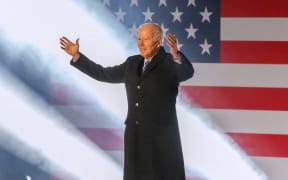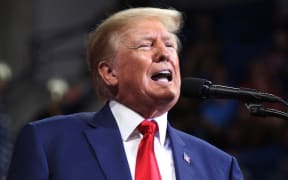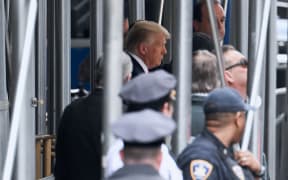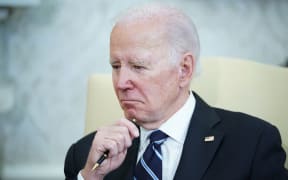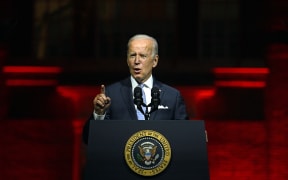By Ross Colvin, Reuters
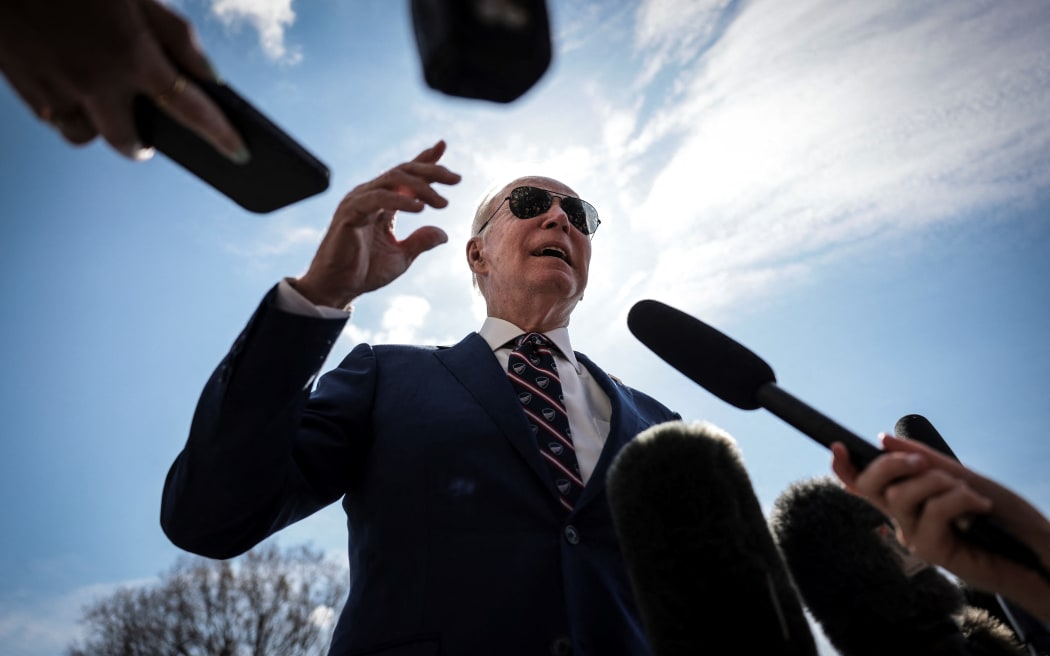
US President Joe Biden speaking to media in the White House grounds last month. He is expected to soon announce he will campaign for reelection in 2024. Photo: AFP/ Oliver Contreras
Explainer: US President Joe Biden is expected to announce his campaign to seek re-election in 2024, Trump confirmed his bid last year, but who else might have their hat in the ring?
Here is Reuters' list of declared candidates and other potential 2024 hopefuls from both the Democratic and Republican parties.
Joe Biden (D)
Biden, 80, has teased his plans to seek a second term for months but so far held off making an official announcement. A source said on Thursday that he could announce by video next week. Political analysts said there was little benefit to him jumping into the race too soon, with the election still 19 months away. In the meantime, he could continue to look presidential, although he still had poor approval ratings in opinion surveys. He did not face a serious threat from a Democratic challenger.
Donald Trump (R)
Trump, 76, announced his election campaign last November as he faced some of the loudest criticism yet from within his Republican Party over his support for far-right candidates who were defeated in the midterm elections. Like Biden, he remained unpopular with great swaths of the electorate. But he had retained an iron grip on his base and strengthened his standing in polls after he was indicted by New York prosecutors in connection with an alleged hush money payment to a porn star. Trump was the front-runner in the Republican race.
Ron DeSantis (R)
The Florida governor, who styled himself as Trump but without the drama that surrounds the former president, had yet to announce but had made all the traditional moves of a would-be presidential candidate. DeSantis, 44, who ranked second to Trump in most polls, had signed bills imposing new restrictions on abortion and further loosening gun laws, positions that may help him in the Republican primaries but would likely hurt him among independent and more moderate voters in the general election. His battle with Walt Disney Co over its Florida theme park unnerved some donors, as did his mixed messaging on continued US support for Ukraine and reluctance to respond aggressively to Trump's personal attacks.
Nikki Haley (R)
A former governor of South Carolina and Trump's ambassador to the United Nations, Haley, 51, emphasised her relative youth compared to Biden and Trump as well as her background as the daughter of two Indian immigrants. Haley gained a reputation in the Republican Party as a solid conservative with the ability to address issues of gender and race in a more credible fashion than many of her peers. She had also pitched herself as a stalwart defender of American interests abroad. She attracted about 3 percent support among Republican voters.
Tim Scott (R)
The only Black Republican US senator had low name recognition outside his home state of South Carolina, but his optimism and focus on unifying his divided party had helped him draw a contrast with the more aggressive approach by Trump and DeSantis. Scott supporters, however, had acknowledged that while his sunny demeanour was a selling point it might not be enough to defeat the front-runners, especially DeSantis, who could point to a list of conservative legislative accomplishments. Scott, 57, had launched a presidential exploratory committee but not yet confirmed he planned to run.
Asa Hutchinson (R)
The former Arkansas governor launched his bid for the White House in April with a call for Trump to step aside to deal with his indictment. Hutchinson, 72, touted his experience leading the deeply conservative state as proof he could deliver on policies Republican voters care about, citing tax cuts and job creation initiatives as particular sources of pride. Still, his name recognition remained limited outside Arkansas.
Mike Pence (R)
Trump's vice president broke with his former boss over the 2021 attack by Trump supporters on the US Capitol, while Pence was inside the building. Pence, 63, said "history will hold Trump accountable" for his role in the attack. However, Pence, like other Republican White House hopefuls, came to Trump's defence after New York prosecutors charged him in the hush money case, underscoring the fear of alienating Trump's supporters in the primaries. Pence said he was still deciding whether to seek the Republican nomination.
Chris Christie (R)
The pugnacious former New Jersey governor was reported to be mulling a possible campaign. Christie, 60, ran for president in 2016 and was a one-time supporter of Trump, but turned against him over the 2021 attack on the US Capitol.
Chris Sununu
The New Hampshire governor was also testing the waters of a presidential run. Sununu, 48, who served as governor of the small New England state since 2017, said the Republican party needed new leadership and he did not believe Trump would be able to beat Biden.
Vivek Ramaswamy (R)
A former biotechnology investor and executive, Ramaswamy, 37, launched a firm in 2022 to pressure companies to abandon environmental, social and corporate governance (ESG) initiatives. He announced in February he was running for the Republican nomination. The political outsider had excited a lot of grassroots chatter as a potential alternative to Trump but remained a long-shot candidate.
Robert Kennedy Jr (D)
An anti-vaccine activist, Kennedy, 69, was making a long-shot bid to challenge Biden for the Democratic nomination. He is the son of US Senator Robert F Kennedy, who was assassinated in 1968 during his own presidential bid, and a nephew of John F Kennedy who was earlier assassinated while president. Kennedy was banned from YouTube and Instagram for spreading misinformation about vaccines and the Covid-19 pandemic.
Mike Pompeo (R)
Trump's former secretary of state and director of the Central Intelligence Agency had been seen as a potential contender, but he announced last week that he had decided not to run due to personal reasons. The former Kansas congressman was one of Trump's most loyal lieutenants and initially backed his false claims of a stolen presidential election in 2020.
Glenn Youngkin (R)
The hedge fund manager turned Virginia governor was also seen as a possible contender for the Republican nomination after he focused on parents' rights in schools in his gubernatorial campaign. However several of his key staff recently joined the DeSantis camp, suggesting that Youngkin would not run in 2024.
Marianne Williamson (D)
The best-selling author and self-help guru launched her second, long shot bid for the White House. She ran as a Democrat in the 2020 presidential primary but dropped out of the race before any votes were cast. She officially launched her latest campaign on 23 March, and said she wanted to challenge Biden in the Democratic nominating race.
-Reuters
